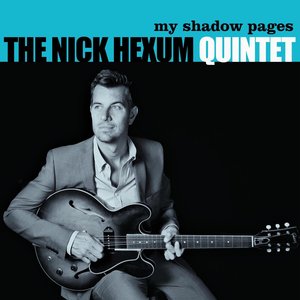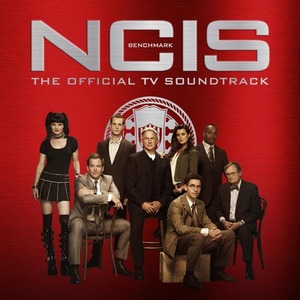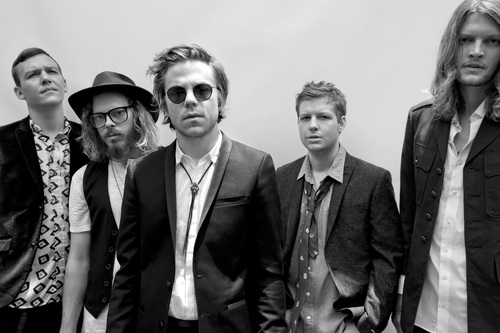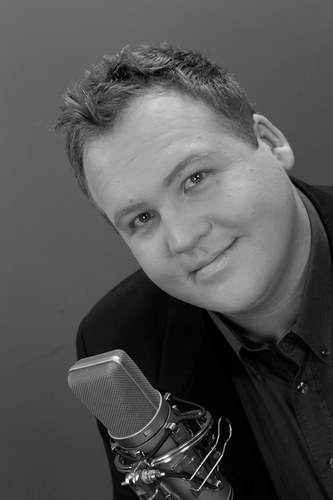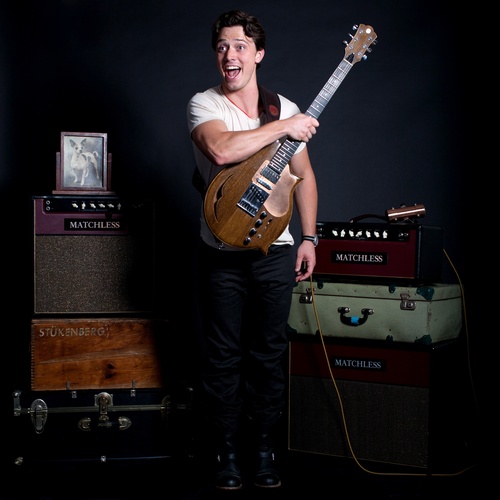A Conversation with Nick Hexum
Mike Ragogna: So Nick, you have a new album, My Shadow Pages. This is your first solo album, right?
Nick Hexum: This is my first solo album. I've guest spotted on a couple of bands, I sang songs with the bands The Urge and Sugar Ray a really long time ago, so this is the first solo outing of my own.
MR: You're the lead vocalist for 311, and had these other projects over the years, but why didn't you attempt to do a solo project earlier?
NH: Yeah, that's a good question. I guess it happened really organically, where at some point, I decided I really wanted to get better at guitar playing and 311 has a lead guitarist, so me and my brother Zack started plotting a just-for-fun jam band and at the same time, we'd also been attempting to write pop songs for other artists, so, "Let's just try to combine the two to make a jazzy jam band with some cool, comfy, jazzy pop songs," and thus The Nick Hexum Quintet.
MR: Why a "quintet"?
NH: I've kind of been researching creativity, and one of the things that really inspires creativity, if you learn from companies like 3M or Apple or whatever, they encourage you collaborating with different people a lot. So I kind of made my own quintet with a maybe somewhat revolving lineup of guys just as a way to freshen up the creativity.
MR: What was the writing and recording process like?
NH: Well when I was attempting to co-write I made some fun new contacts, like working with Tim Pagnotta who was in Sugarcult, Kevin Griffin from Better Than Ezra, other writers and producers. So I'd known those guys and I was like, "Well I'm writing for myself now, let's do a co-write." It was just a real fun, easy process because we didn't have to worry about how some of those pop artists at the moment might want this style and try to telegraph what they're going to do. Instead, it was just whatever was fun and we liked. It's much easier to write for fun and for yourself than for anybody else. So that kind of started from people I met from that kind of songwriter-for-hire circuit, which I don't really care for anymore. I met some of the guys on the first day of pre-production. We did three days of pre-production, like Gary Novak walked in and we just played together and that was on a Wednesday. Then on Monday, we were in a studio together for Monday through Friday and then that record was done. What you're hearing here is a band that's been together for three days, so it's very different from my normal way of doing things.
MR: On the other hand, that probably added to the inspiration and the spontaneity of the sessions.
NH: It was, getting to know somebody as we're playing. I was pretty nervous the first day, but it came out great. I've always known that nervous energy is adrenaline and will just lead your brain to be its best. So I never shy away from that, I always say walk towards the fear.
MR: Nice. Now, you have no fear when it comes to 311. You're the front man, basically. Do you feel like your experience has helped you get to this point in your musical career?
NH: Yeah, I mean, I've built up confidence through all of those experiences, those years on the road with 311, and everything kind of works together. I thought it was a time to open up a new thing for putting out stuff that the guys in 311 might not be interested in. Take a slow blues song like "You'll Do It Again," that's not really territory that 311 would be into. Music, in general, tends to evolve for the platform that it's played for. David Byrne was talking about this in his book How Music Works and he was like "Hip-hop is made for cars. Jazz, with its intricate chord changes, is made for a tight little club. If you were trying to play that in an arena, it probably wouldn't sound that great, it would be too mushy. You need a tight, non-reverberating space." It's kind of a tangential way of saying that 311 generally makes music for rocking amphitheatres and it's a fun summertime experience like that, so to take something really small and intimate like me performing the Bob Marley cover by myself or doing a weird slow blues song like "You'll Do It Again" that clocks in at nearly six minutes, that really is kind of a different animal from 311.
MR: Since you've had so many number one records and huge success with 311, do you have an expectation for this record that's along thos same lines?
NH: No, I don't think it's going to be in that same ballpark. I think I want to be able to make back the money that I invested in the project, but I definitely think it'll be smaller. It was more just purely for creative reasons. It's been a fun thing for me to be very involved in the label side of things and plotting the roll out and working with a publicist and management has basically become the label because it's my label and setting up the distribution. It's been getting into areas that I've always had an interest in that I never... We were always on a major label. So it's definitely different doing it so independently and being part of the rollout.
MR: "Blame The Sky" seems to be the lead track from the album. It can be interpreted in a couple of different ways, but what was your intention with that?
NH: Man, it's a totally wide-open interpretation because that came totally stream of consciousness. Zack, my brother, had that title in his list of ideas of titles and I was like, "I love that, let's work with that," and he threw out something and I threw out something and it was just back and forth and back and forth and back and forth. To me, it's about seizing the day, going for it, if you need an excuse, blame the sky. It's a carpe diem kind of method.
MR: And is that also how the creative process works with you? Does it go through a steam of consciousness thing and you look at it later and either refine it or go, "Okay, that's what I wrote"?
NH: Yeah, I think that does happen some way. Sometimes, it's very unplanned and then others, I'll just have a title that suggests a story like "The Getaway," that's about a place, this somewhat fictitious place that has elements of dive bars of my past, and that's a story that came together. The song "Sideways," that word just has so much story built in, we can't go forward, we can't go back, we keep going sideways. I kind of suggested a theme and me and Tim Pagnotta just kind of worked it out. But there is no song on this album that was by myself, it's all collaborations. Even the song "The Dreamer." My wife and I sat down and cranked out those lyrics. She said, "I don't want to go through the hassle of setting up a publishing company, so you don't need to credit me," but I'm telling the world right now that she co-wrote that song with me. They're all co-writes on the record.
MR: This album satisfied a side of you that needed to get expressed, right?
NH: I think so, yeah. I was somewhat inspired by what "SA" Martinez in 311 did with Ghostwolf. He put out his own side-release, maybe it's been about a year or a year and a half ago since he put that out. I was like, "That's cool." It's good to open up a new avenue rather than letting those songs languish on some hard drive, forever unseen. Also, I guess I'd kind of gotten to a place where I realized I had more time to do more styles of music. A few years back, I was reading about a certain actor who was directing movies, starring in movies. He's opening a club, he's going back and getting his degree, it's just ridiculous how much stuff this guy was doing, and I was like, "You know what, I could be doing more stuff. I'm going to open up a solo side project path." I definitely think it's been a fun journey.
MR: Well, after working with so many acts as well as your own music, it seems you're the guy who needs to be working on creative stuff all the time.
NH: Yeah. I just like being productive. I'm somewhat hyper-responsible to a fault, where I'm waking up and planning my day, "Okay, eight to eight-thirty, I can jog with the dogs, eight-thirty to nine, I can be warming up my guitar skills, then I can hang out with the kids for a while." And then I can be at the studio... I'm a super ambitious and organized guy and sometimes, I need to learn just to like not plan my time. But that's what kids are great for. They're like, "Daddy, let's go jump on the trampoline," and I'm like, "You know what, that is the perfect thing right now. Let's do go jump on the trampoline."
MR: Sweet. What is your advice for new artists? I know it's a little tricky these days.
NH: Yeah, the mechanics of distributing your music are so different now. You can launch just from a viral video. In a way, we didn't really need a major label just to get started in the beginning. That's really only just to get the records out. We ended up doing it just through touring. I suppose the one constant between now and then is just work on your live show and work on building up a local following wherever you are. We were in Omaha and building up a big following there was what lead to us getting a deal. We did move out to LA, but then we went back to Omaha to showcase for the label because we wanted them to see us in front of our home audience. So it doesn't matter where you're from, just build up a big following and then you can just expand from there. The industry's changed so much to where if you can't cut it live, you're not going to have a chance because it all comes back to playing live. That's something that cannot be pirated, that live experience of watching somebody create. That's also what inspired me to do the quintet, because there's going to be a lot of improvisation, a lot of unscripted moments, so people can actually see us make it up as we go. I'm getting really into watching a lot of jam bands and seeing how they interact with each other and the audience and just going higher and higher. So I always say it's all about the live setting.
MR: Nice, and that's the strength of jazz, its live and improvisational elements. Jazz artists don't traditionally sell millions of albums.
NH: Yeah, you have to tour, and they love it. I saw John Scofield last year, I'm going to see him again at UCLA. He's my guy. That's my inspiration, his tone, his soloing style, the way he combines funk and jazz, he's my inspiration. He's an older dude, but he tours a lot because he loves it and he really shows his gratitude when he's playing and the things he says to the audience. It's definitely nice work if you can get it. I love to play.
MR: And Avi is amazing. I know some purists don't like the loop approach, but it really works with what John's doing, he always has been experimental anyway.
NH: Avi Bortnick is one funky rhythm guitar player. I'm really looking forward to seeing that. When I saw Scofield last year, it was more of a traditional jazz thing, but I've seen him do the A Go-Go album, not with Medeski Martin & Wood, but with other guys playing that album back in LA in the mid-nineties, so I'm really excited to see him get funky next month.
MR: Maybe there's a Scofield/Hexum project down the line.
NH: You never know!
MR: You'll be jumping back into 311 when that arcs back, right?
NH: Yeah, we're recording this new batch of songs and it truly is amazing. I'm very excited about it. As soon as Chad [Sexton] is done with the drums, we're going to go ahead and add our parts. We're putting it out in Spring around 3/11 day. My plate is full and that's how I like it.
MR: Nick, this has been wonderful and I really appreciate your time.
NH: I really enjoyed it. Thanks for the support.
Transcribed by Galen Hawthorne
"UNDER THE SUN" WITH NCIS' MICHAEL WEATHERLY
According to actor/musician Michael Weatherly...
"'Under the Sun,' it's an interesting song. It has a strange group of meanings, a whole cluster of ideas about existential journeys and self examination. Cote de Pablo leaving NCIS, it's got a lot of different things going on inside it. It really started in September 2001 initially as a reaction to events of that month and then was also a little bit about my son at the time. And then it went in a draw and came back out and producer Jimmy Harry and the very supportive Josh Rexon and a whole team of people helped make the song some alive in it's current form and I am very proud of it."
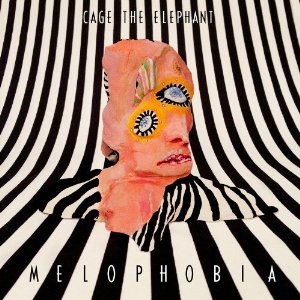
A Conversation with Cage The Elephant's Matt Schultz
Mike Ragogna: Hey Matt, how are you?
Matt Shultz: I'm doing well, how are you?
MR: Pretty good. I want to talk to you about a couple of things. Let's start off with "Come A Little Closer," which was the number one added track on alternative radio. What does it feel like to have instant acknowledgement from radio and fans over the latest Cage The Elephant project?
MS: It feels great. It always comes as a surprise. Usually, in the beginning stages, it's always hard to believe. You wait to see some kind of tangible proof that it's finding its way to people's hearts and not just kind of an industry push, if you know what I mean.
MR: Yeah. It seems that to have a number one record, it has to be for reasons beyond just a lot of promotion; you have to have the goods.
MS: Our main goal as songwriters is to tell stories that are compelling and impactful and honest. I always felt that the songs reach people and provoke thought and searching or even just illustrate some sort of picture that captures a person for longer than the three minutes it might be on the radio. It's always exciting and a surprise.
MR: How did the song "Come A Little Closer" come together? Do you guys have a usual creative process?
MS: When we first started writing, we had several different visions for how we thought the record might turn out and this was kind of more geared towards that more intimate, close sound at first. Actually, before we were even conceptualizing sounds, we had just done Lollapalooza in South America. I can't remember which city it was, but we were in one of the airports and there was just this amazing flamenco guitarist and he had a real gypsy nature to what he was doing and it was just fricking gorgeous. It had that sound that just puts you into a trance. Do you remember the movie Big?
MR: That's one of my favorite movies.
MS: Yeah, and the part where he goes to the genie machine and the circus music comes on and just puts you in this strange hypnotic state, reflecting and whatnot? Well, this guitarist is playing some stuff like that. It just was inspiring. I had an acoustic guitar with me and I went to a terminal where there weren't a lot of people and pulled out the guitar and just started playing something similar. The funny thing was in my mind, I was thinking Bulgarian folk or something. But that was kind of the first stage of things, and then I think in another city, it might have been in Brazil, São Paolo. I got up early one morning and my hotel was just overlooking all of the shacks on the hill that were built out of tarps and tin roofs, a makeshift city, and I was just moved and started messing around again and came up with the chorus and then bridged the two together. Then the rest of the song took shape when we met up with the band.
MR: Interesting, especially since Melophobia has, to me, some global nods in spots.
MS: Yeah, I guess so, because a lot of it was written while we were moving around and definitely while we were more inspired and impacted by world experiences being more exposed to different cultures and people. I always find it so strange because we have these cultures that seem so far apart at times but there's always the common fiber that runs through it, which is family. You see a grandparent interact with a grandchild and it doesn't matter where you are, it looks the same.
MR: Really true. Now I've been a long time fan, and "Cage The Elephant," to me, seems like it could also be a reference to how you just can't contain the musicianship, the creativity, or the fun that you guys are having.
MS: Oh, thank you.
MR: Is that what's going on these days?
MS: I don't know if we think of it on those terms. We tend just to focus on the creative process and where we are at that point, not necessarily on trying to be uncensored or unbridled. A lot of our struggles aren't against exterior forces but really our interior. A big part of this record was trying to overcome that overwhelming lure to cater towards "cool" or to write towards a particular sound that maybe, at that time, we see society as being artistic or intellectual or creative rather than writing from a place of honesty. This past year, me and the band had a lot of revelations. Hopefully, they'll be long term revelations. But it's just become very apparent to me that there are many different purposes for music: to entertain, to relieve pain, to express a thought or a feeling, to tell a story. One of the main purposes, at least speaking for myself, is to be a communicator. Upon having that revelation, I dove into this idea that the more we could pull away from the institutional sounds that we as a culture have deemed acceptable and just use music as a communication, hopefully, the more impactful the songs can be. What I mean by that is that there is this overwhelming lure to write towards sounding intellectual or artistic based upon what has been seen as artistic or intellectual in the past. Sometimes, I think the honesty gets sacrificed for aesthetic and feel, you know? I love all that stuff, I love hearing well-crafted and stylized songs sonically, but at the same time, another revelation that I had was just the uniqueness and the beauty of the human fingerprint.
The fact that we're a bunch of creatures crawling around on a planet in the middle of the universe is an anomaly, and the fact that you can make sounds that are pleasing to the ear is even more beautiful. In the past I'd always tried to hold fast to that slogan that a lot of literature writers hold to, which is "Read way more than you write." So I would apply that to music and would try to listen to as much and as diverse music as I possibly could and kind of be a conduit or a sponge and try to find holes and combine sounds to make something that maybe I wasn't hearing exactly like what I was doing at that time. On this record, it was different though, where I almost stopped listening to music completely. The experience was comparable to trying to draw your childhood house purely from memory. Sounds and things are burned into my psyche and will be there for the rest of my life probably, but it was such a direct influence and it was really amazing because I found that there are blanks that the human mind will fill, sonic blanks, with emotional experiences, and creates sonics that never even happened on particular records purely based upon a memory of an emotion. It was crazy because you can either be in a group of people discussing sounds and records and everyone in the group will be in agreement and it's nothing like what the entire collective agreed upon.
It's crazy, the power of suggestion. It also shows how emotional we are and how we're affected by our emotions connected to memories and times. But it was a really amazing experience. Before, it was like trying to absorb as much style as I possibly could, hoping that somehow you could come up with something different as a culmination of all the elements. But this time, it was like trying to shake off that pre-learned style and just allow experiences to speak through the music. There are many different great approaches, though, and absorbing music isn't a bad approach. It was just that on this particular record, we experimented and pushed outside that and it was pretty cool.
MR: You also had an old pal with you again, who's almost an additional member, producer Jay Joyce. What was your first reaction when you heard his In Pursuit project from the eighties?
MS: I haven't heard that.
MR: Oh, you've got to hit him up for that! He was part of a group called In Pursuit on MTM, Mary Tyler Moore's label. You've got to have him play that stuff for you.
MS: [laughs] Yeah, he's played me some stuff from another band of his called Iodine, which was really cool. Jay is an incredibly talented person, very diverse, he's the type of guy that always slides under the radar. It seems like you never really see the cool stuff he does, you just hear it later.
MR: I totally agree, he's one of these mega-creative guys that's behind the scenes on a lot of projects.
MS: Yeah. He has an incredible ability to hear what you're going for, to interpret that, and to make it happen and also to pull more out of you. Jay's the type of person that will totally confront you in your shortcomings. If you've written a part that isn't quite there yet, he'll tell you. That's one of the best things and worst things about Jay. It's one of the hardest things to deal with, but it's one of the reasons why we make records together; because he pushes us to the full extent of our potential.
MR: On this new album, is there a song that we need to run to immediately?
MS: I don't know, I can only speak for my favorite tracks on the record, but there's a track that we did with Alison Mosshart, which is really cool. It was inspired by "I Put A Spell On You" by Screamin' Jay Hawkins. So that track was kind of like this morbid love story of a man who was grossly obsessed with a girl, and we'd written this song and I was trying to find the character in the song and I just thought it would be cool if it was a male and female duo, but instead of it just being one-sided in this morbid love, if both partners of the relationship were grossly obsessed with each other. I was like "That would be interesting," if it wasn't just one-sided, if they both were just completely obsessed. That was a really fun song to write and it was great to have Alison Mosshart on the track because she totally killed it and got the character and it sounds phenomenal. She's just so talented. Then there's "Telescope," which is probably my favorite track on the record. It's kind of like a self-portrait from a third party. I just thought it would be interesting to write a song about yourself as if you were watching yourself through a telescope on a different planet far away and how you might feel different about your everyday habits and the meaningless things that we fill the void with. We'd been on the road for like five years and this was the first time we spent any time off the road and I got a house for the first time. So I moved into my house and I got obsessed with decorating this house, which there was no one in but me, and then the house was decorated and then I'm like, "Okay, I'm in the living room. I think I'm going to go walk in the kitchen for a while." So I'd go walk to the kitchen and stand in the kitchen and any time I needed a change of scenery I'd go to a different room. Sometimes I'd just be sitting there staring at a blank TV screen and be like, "What is the point?" "What am I doing here?" "Why am I filling my life with all of these tedious little tasks that aren't making any kind of contribution to anything other than my own entertainment?" It was a song that was kind of about that with a little more color and playfulness.
MR: What advice do you have for new artists?
MS: Just to pour your whole heart into your creative works. With each one of our records, we try to become more and more transparent and to hide less of ourselves with each song that we write and also to pour everything we have into it. Let go of this kind of romanticized rock 'n' roll fairytale and write songs for the sake of writing songs and for the art of it and the expression of it, and do it with everything you have. I come across a lot of kids who have big dreams and high hopes, but they're not spending the time with it. If you look at some of the great composers throughout history like Bach or Mozart or Beethoven and you look at their history and just how immersed in music they were, it's no wonder they wrote thousands of masterpieces; because they spent time with it.
MR: What does Bowling Green think of its native sons these days?
MS: [laughs] I can't speak for Bowling Green, but we have a lot of great friends and family here, a lot of support, and over the years, it's been great that I have a really solid core of friends and family that are super honest with me and will tell me if a song sucks or not. I think that's important. So we still have the same process, we come home and spend time with our friends and we sit around and write songs and we bash each other and build each other up and it's just really cool.
MR: Does it feel like each album is a new beginning?
MS: Every record feels like we've just started, for us. It's kind of like every time you finish a record and step away from it, when you step back to begin writing again, it's like you've forgotten everything that you knew and you have to relearn everything. You can't just fall back on your past experiences or success or whatever; it's always like a new trip and there's more ground to cover. I feel like it's always the first time I've learned how to write a song. "Now I finally get it!" It's just beginning. I hope it's always like that.
MR: I hope it's always like that for you, too. I've been looking forward to this interview, I really appreciate it.
MS: Yeah, I appreciate it as well.
MR: All right, all the best and take care. Hopefully, we'll talk in the future, let's do this again some time.
MS: For sure.
Transcribed by Galen Hawthorne
ROCK PAPER SCISSORS LIZARD SPOCK
According to Geoffrey The Giant...
"I'd been watching The Big Bang Theory for a few years now and got the idea for the song after seeing one of the episodes that featured the game, "Rock Paper Scissors Lizard Spock." Essentially, the song and the video depict an alternate reality in which Leonard and Raj settle a dispute in true Big Bang style--with a game of Rock, Paper, Scissors, Lizard Spock. Sam Kass, the inventor of the cult game who has been hailed on the show itself, loves the tune and gave me his full seal of approval to market the song after he heard the track.
"I'd loved what RSM Creative did with Carly Rae Jepsen's video for "Call Me Maybe," so I got in touch with Robby Starbuck and set things up to shoot the video in LA with director Behn Fannin. We built a cafeteria set to look like the one used on the show, and did our best to choose actors that not only looked the part but had the talent to play it. Everyone did a bang up job in the one day shoot."
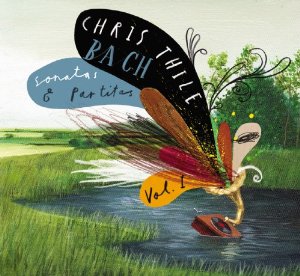
A Conversation with Chris Thile
Chris Thile: Mike, how are you doing?
Mike Ragogna: Oh, I'm doing well, how are you doing, man?
CT: I'm doing great, just sort of galavanting around Portland, Oregon, right now.
MR: Good for you, nice, hope you're having a greattime. So Chris. Bach: Sonatas & Partitas Part 1. What's going on here?
CT: I know, I know, I know, Crazytown right? I was exposed to Bach when I was fifteen or sixteen by a trio of relatives including my maternal grandmothers. I have two through divorce. Grandma Celia gave me a recording of the Brandenburg Concertos and Gradma Sal gave me Glenn Gould's second recording of the Goldberg Variations, and then my Great Aunt Rosie, also on my mom's side, gave me recordings of Bach's Double. It might have been Grandma Celia who also gave me shortly thereafter Yo-Yo Ma's recording of the cello suite. So it could have all happened at once. It was Gould's recordings of Goldberg that really provided me with a way in, with a foothold, because up to that point, I had thought of, for lack of a better word, "classical" music as being something that was fairly rhythmically disconnected from the body. It didn't make me move, it didn't make me just leap out of my chair, but all of a sudden, here's Glen Gould just bringing it home like John Bonham or something. I was just hooked. It was because of Gould's almost pop-like approach to the rhythm of those pieces--and when I say pop-like, I kind of mean metronomic only with so much soul, which is kind of what's so fun about pop music. You can count on it, rhythmically and physically speaking, you can count on pop. So then can you count on Glenn Gould to deliver a danceable experience with the most complicated Bach music. That was my way in. I could hear it, instead of just switching off and saying, "This is just," I don't know, "music for people with wigs." So that started it. That's why there's Bach for me. I gradually got interested in tons and tons of classical music, but certainly Bach still stands above everyone else, and I think he does for a lot of serious musicians. It's like he was a little one-man musical enlightenment.
MR: Bach has had that effect on a lot of people, and it was almost like the pop of its era, too, I think maybe that's why he keeps getting revisited. As a composer, I think Bach understood that, and I think the best interpreters of Bach are the lively ones, sort of like you mentioned.
CT: Right.
MR: Now obviously, Nickel Creek did not play Bach Sonatas, and Goat Rodeo doesn't really go there and Punch Brothers don't really go there...
CT: ...well, Punch Brothers actually have gone there. Not a whole lot, but we played the third Brandenburg Concerto together, but never on record. That's been sort of a special treat for a live show here and there.
MR: Right on. My point is Chris Thile, right now, might be looking at this kind of music as the basis for his solo career.
CT: I think that I'm so curious about what I perceive to be an historical separation between an intuitive and learned approach to music, that the two have been unnaturally separated for hundreds and hundreds of years. I think initially, the separation made sense because it was a question of class. If you had money and you were musically inclined, then you would pursue a learned approach to music and you would go study it, and if you didn't have the money but you were musically inclined, then you would just make music. So I kind of hope that all of my activity henceforth is sort of wrapped up in earnestly seeking a dissolution between those distinctions.
MR: And you have historically done that, for instance with Goat Rodeo. That's a blend of all of your flavors including folk and classical, like you were saying.
CT: Right, that's kind of the idea, and Punch Brothers are searching for that kind of music, music that hits one in the body and the head and the heart to where you hopefully can disarm all of those areas and then get people to just kind of feel. I know for me when I listen to music that starts to feel purely visceral then my mind gets a little skittish. It's like it's a little overactive. But if only my mind is being appealed to then my body gets bored, I get listless and I can't pay attention. But when both of those things are engaged, that's when I feel like my whole body can go limp and all of a sudden, I'm possessed by the music. It's almost as if a new camera in the documentary that is my life gets switched on and I have a wholly new perspective.
MR: Beautiful. Chris, of all these songs that you recorded for this Bach project, which possessed you the most?
CT: I feel like he's almost always striking that natural balance between viscerally and intellectually charged or viscerally and cerebrally charged, if you like. So I can't even tell you; I was just engaged from start to finish. We were having these epic days in the studio in the Berkshires, in this beautiful old hotel called The Blantyre, and we'd break and then head to the studio and play Bach all day long and then go back to The Blantyre and have to put on coats and ties for dinner. It was so awesome. They were magical days. To get back to the question, though, I suppose that of the stuff that I recorded, I would get the most lost in the A minor fugues. But every now and then, we'd be playing one of those slow, meandering movements. Actually, one that was really fun was the Siciliana in G Minor. On the recording as it transitions, you can hear, all of a sudden, this wind picks up, so after we'd gotten done recording the fugue and we went into recording the siciliana, this incredible wind was whipping all around the studio and there was no way to not get that to show up on tape. Initially, I was really dismayed about that as I was listening to the tracks, but I've come to really enjoy it, and it was so much fun to play that piece.
MR: Obviously, this being "Part 1" opens up the possibility for a second volume, but what about taking on the works of some other classical artists? Are there any others that move you in a similar way?
CT: We're definitely going to do a second volume and finish this music up. Punch Brothers just had a writing session for its next project and there's some Debussey piano music that I would love to try and explode into a Punch Brothers song. I'd actually take a little bit more liberty with the music, hopefully, doing nothing that all collides with the screw ups. But just to get it from the piano to a five-part piece in a really satisfying way, I'm excited to try a couple things like that. Certainly, I love playing Bach with the Punchies. I've also always wanted to do a band transcription of the second movement of Bartók's Concerto for Orchestra, which is a piece that I just find to be endlessly delightful.
MR: Chris, what advice do you have for new artists?"
CT: Oh, let's see. My chief advice right now would be to have periods of both voracious listening and complete silence. Listen, listen, listen, listen, be so honest with yourself about what you love and what you don't love about what you're hearing and then, in those periods of silence, think about what it is really that you want to hear yourself do and actually be informed both by the things that you love and the things that you don't love. With the things you love, be like, "Why?" and with the things that you don't love, why do you not love them? What would you have done differently? Often in that amalgamation of the learning process of why you love this and why you don't love that, often times, those are the two primary ingredients in a unique sound. The reason that you love all of the various things that you love, I guarantee you that you're the only person who loves all of those things for that reason and also on the negative side of that, all of those things that you don't love, you're the only person who doesn't love them for all of those reasons. I think if you're really paying attention to how music makes you specifically feel--and granted, you learn so much from other musicians and from observing other people's cases and having deep discussions about music you can learn a lot--but I think the most important thing is to be really, really in touch about how music makes you feel.
MR: Beautiful. You're going to be touring for the album, right?
CT: Yes. This is my first proper solo tour in America. I've done a couple of different solo tours in the UK mainly because Punch Brothers couldn't afford to tour over there, but this is the first time that I'm touring behind a solo record by myself on tour. I think it'll be really fun.
MR: Are you going to be joining your fellow goat Yo-Yo Ma with his Silk Road project at all?
CT: Not that I know of, although Yo-Yo and Stuart [Duncan] and Edgar [Meyer] and I have some plans. We're just starting to talk about plans for some more Goat Rodeo activity, which I'm really excited about.
MR: I remember when I interviewed both you and Yo-Yo for Goat Rodeo, you both said, "Yeah, we think it's a one shot deal, we may do a live album." But you guys got hooked, didn't you.
CT: We got hooked. We got hooked, especially with this last tour. It was just so much fun and to play like that for audiences like that is just addictive. You don't want to give that up.
MR: Nice. Hey, all the best, Chris, it's always fun talking to you.
CT: Thank you so much, Mike.
MR: You've got it. Bye Chris.
Transcribed by Galen Hawthorne
IT'S "ALL THE SAME" FOR STÜKENBERG
Austin-based rock outfit Stükenberg is set to release its third album, Novella, on November 12th. With a sound characterized by songwriter and multi-instrumentalist frontman David Stükenberg as Appalachian-Rock, Novella finds inspiration in early Fleetwood Mac's eerie backwoods melodies and the distorted, almost-Pentecostal energy of a church service led by Rage Against the Machine. Novella's wildly lush narratives and darkly driven tunes immediately grab your attention and simply refuse to let go.
According to frontman/songwriter David Stükenberg...
"This song started with some old clips of Southern preachers I happened upon from where I grew up in Kentucky. What was interesting about these preachers is when they crescendoed to the high point of their tangents, there was a tempo they had in the back of their heads that they would speed up to keep up with. I took this idea and initially had no melody whatsoever, just a spoken-word rhythm over a counter beat. It sounded like redneck hip-hop at first. Then I was listening to some old Earth, Wind & Fire and became enamored with the idea of the accenting call and response phrasing. Once I had these elements I just wrote a "sermon" that fit the sound. This is probably one of my favorite songs to play live because I get to jump into the crowd and get some stomp-clap action going with our unsuspecting audience."

